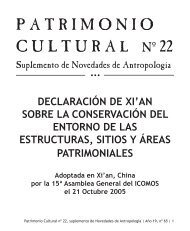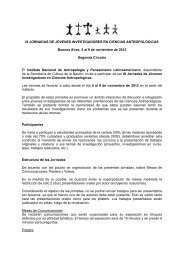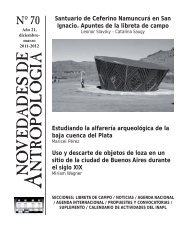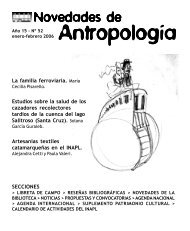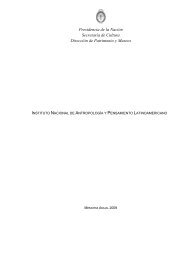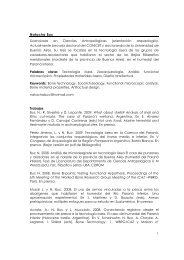- Page 2 and 3:
II Jornadas Nacionales de Antropolo
- Page 4 and 5:
EJE V-NUEVOS Y VIEJOS HUMANISMOS Pa
- Page 6 and 7:
EJE I-INDIVIDUO, FAMILIA, SOCIEDAD,
- Page 8 and 9:
proposiciones para un sistema docen
- Page 10 and 11:
Luego del intercambio polémico con
- Page 12 and 13:
La necesidad antropológica de orga
- Page 14 and 15:
Así, Hesíodo ofrece a su hermano,
- Page 16 and 17:
lento camino de la degradación, a
- Page 18 and 19:
Introducción Reflexiones en torno
- Page 20 and 21:
Este tipo de democracia no deja lug
- Page 22 and 23:
Guariglia, O., "El concepto normati
- Page 24 and 25:
Obviamente, no hay una sola manera
- Page 26 and 27:
Como característica general de esa
- Page 28 and 29:
Pero, lo conmovedor, es la renuncia
- Page 30 and 31:
PICOTTI, Dina. El descubrimiento de
- Page 32 and 33:
entendido como una radicalización
- Page 34 and 35:
Bajo el eufemismo de la “donació
- Page 36 and 37:
5- Conclusión Se sigue de lo expue
- Page 38 and 39:
Individuo y comunidad en la primera
- Page 40 and 41:
el empleo de la categoría «herenc
- Page 42 and 43:
IV. A modo de apertura Si leemos co
- Page 44 and 45:
1.1.2. Los deberes del Estado. Fund
- Page 46 and 47:
sexos, entre los cuales la lucha es
- Page 48 and 49:
La distinción hegeliana entre las
- Page 50 and 51:
El espíritu del chamán puede deja
- Page 52 and 53:
osque de una isla volcánica, que u
- Page 54 and 55:
décadas. Los neoindios se reivindi
- Page 56 and 57:
El Uritorco "cerro macho" o "cerro
- Page 58 and 59:
Bibliografía salvación, desde el
- Page 60 and 61:
Notas sobre tecnologías de la iden
- Page 62 and 63:
técnica bajo todas las formas y ha
- Page 64 and 65:
circulación de la obra, siguiendo
- Page 66 and 67:
Calafate, más que una planta 66 Si
- Page 68 and 69:
Para contextualizar la información
- Page 70 and 71:
3.1 El Calafate Dos imágenes de la
- Page 72 and 73:
Mi abuela sabía hilar mucho, teñ
- Page 74 and 75:
Matas de calafate En el informe sob
- Page 76 and 77:
fuente de recursos. Como tal, el co
- Page 78 and 79:
Onelli, Clemente. 2007. (1904) Trep
- Page 80 and 81:
Introducción Migración y Memorias
- Page 82 and 83:
Freud y, fundamentalmente, en Durkh
- Page 84 and 85:
El reconocimiento de memorias en co
- Page 86 and 87:
Inicialmente comenzamos a acercarno
- Page 88 and 89:
“¿Quién le canta al estado-naci
- Page 90 and 91:
También nos interesó plantear alg
- Page 92 and 93:
Le Goff, 1991, Jacques, El orden de
- Page 94 and 95:
Miradas gauchas sobre la autoridad
- Page 96 and 97:
Estandarte del Centro Tradicionalis
- Page 98 and 99:
Montonera de Ensenada reseña la hi
- Page 100 and 101:
Agrupación Gaucha La Legua Santa L
- Page 102 and 103:
Bibliografía Diccionario de la Rea
- Page 104 and 105:
huella. Señal que deja el pie del
- Page 106 and 107:
sobre los antecedentes, la personal
- Page 108 and 109:
las identificaciones culturales. En
- Page 110 and 111:
MURRA, John [1970] 1987. “Las inv
- Page 112 and 113:
EJE III-AUTORIDAD Y AUTORITARISMO,
- Page 114 and 115:
diversas miradas disciplinares cuyo
- Page 116 and 117:
que ya se presentaban diferencias e
- Page 118 and 119:
General. Sería pensable que la par
- Page 120 and 121:
Jay, M. 1973. The dialectical Imagi
- Page 122 and 123:
agrupado de instituciones. Las prá
- Page 124 and 125:
comunidad, es decir, recién cuando
- Page 126 and 127:
Sujeto Moderno y Autoridad Externa.
- Page 128 and 129:
se le indica que debe volver sobre
- Page 130 and 131:
hayan costumbres, leyes y preceptos
- Page 132 and 133:
Hasta aquí, hemos sostenido que el
- Page 134 and 135:
En tanto inserto en una situación
- Page 136 and 137:
¿Por qué obedecer? 136 Alejandra
- Page 138 and 139:
No son éstos los que defienden al
- Page 140 and 141:
contingencia. La libertad no es el
- Page 142 and 143:
esistencia, encontrar en la lengua
- Page 144 and 145:
Autoritarismo y liderazgo: una fusi
- Page 146 and 147:
Alternativa II: los líderazgos inv
- Page 148 and 149:
En éste marco, la posibilidad de p
- Page 150 and 151:
mundo por venir que aún no conocem
- Page 152 and 153:
mundo de los hombres.” (1958: 157
- Page 154 and 155:
instancia, la “totalidad social
- Page 156 and 157:
inversamente proporcional a la asun
- Page 158 and 159:
Pero, habida cuenta de los argument
- Page 160 and 161:
Corporalidad y subjetividad. Claves
- Page 162 and 163:
El cuerpo como resto también peca
- Page 164 and 165:
cual: “la conciencia es originari
- Page 166 and 167:
Introducción El universal cuestion
- Page 168 and 169:
mujeres en dicho universal signific
- Page 170 and 171:
impugnarlo como un concepto adecuad
- Page 172 and 173:
▪ BELTRÁN, Elena, MAQUIEIRA, Vir
- Page 174 and 175:
Introducción Del joven Marcuse sob
- Page 176 and 177:
sobre las posibilidades de existenc
- Page 178 and 179:
objetos hace del ser humano un ser
- Page 180 and 181:
Los individuos son los hombres y mu
- Page 182 and 183:
que ésta ha hecho del hombre, de s
- Page 184 and 185:
En esta forma no auténtica de la e
- Page 186 and 187:
Referencias bibliográficas BERCIAN
- Page 188 and 189:
considerando que el hecho de que ta
- Page 190 and 191:
Esta situación implica dos serias
- Page 192 and 193:
Rubin, G. (1975), “The traffic in
- Page 194 and 195:
como: “mi cuerpo es mío” o “
- Page 196 and 197:
concibiéramos a este grafiti y a c
- Page 198 and 199: habitar en un mundo donde habita el
- Page 200 and 201: Deleuze apoya la versión foucaulti
- Page 202 and 203: educe a la perpetuación del presen
- Page 204 and 205: Dialéctica entre naturaleza y cult
- Page 206 and 207: como un nudo entre naturaleza y cul
- Page 208 and 209: diferencias y al mismo tiempo de su
- Page 210 and 211: Este tópico heideggeriano en torno
- Page 212 and 213: concreto, un proceso histórico. Pa
- Page 214 and 215: Sein und Zeit. En este sentido el c
- Page 216 and 217: el marco de la naturaleza, ha incor
- Page 218 and 219: la raza humana viene acumulando des
- Page 220 and 221: eaparecer, tal vez, un poco más al
- Page 222 and 223: olfativos, visuales…) que pueden
- Page 224 and 225: ¿Qué ha ocurrido? ¿Se ha tenido
- Page 226 and 227: personificación en Melville (Kessl
- Page 228 and 229: Melville, Herman (1851a). Moby-Dick
- Page 230 and 231: fácil de soportar.” Ellos alaban
- Page 232 and 233: está mal asumida y defendida, sin
- Page 234 and 235: La ética en Levinas como la dimens
- Page 236 and 237: Levinas propone un humanismo que es
- Page 238 and 239: El otro se rebela al yo en el plano
- Page 240 and 241: -LEVINAS, E., De otro modo que ser
- Page 242 and 243: de la preestablecida en la consider
- Page 244 and 245: Bajo estos términos, Merleau-Ponty
- Page 246 and 247: Humanismo y paternalismo: alegato p
- Page 250 and 251: central en tanto provee de una crí
- Page 252 and 253: §3. El cuadro presentado en la sec
- Page 254 and 255: En este caso hay una intervención
- Page 256 and 257: Introducción Para pensar un nuevo
- Page 258 and 259: ¡Qué sé yo quién lo sabe! No s
- Page 260 and 261: como su condición, es decir, a la
- Page 262 and 263: dignidad y por su derecho de ser hu
- Page 264 and 265: Hacia un nuevo humanismo: humanismo
- Page 266 and 267: podrán erigirse valores y ejercer
- Page 268 and 269: siempre expuestos a la interpelaci
- Page 270 and 271: Bibliografía Buber, Martin. Yo y T
- Page 272 and 273: Dos cuestiones aparecen como ejes a
- Page 274 and 275: todos los hombres. En ello consiste
- Page 276 and 277: puede llegar a ser realmente opresi
- Page 278 and 279: aclaración del autor: "Me extraña
- Page 280 and 281: Contra esa tesis declaro aquí, y l
- Page 282 and 283: El momento de la integración es a
- Page 284 and 285: - Salazar Bondy, Augusto, (1965):
- Page 286 and 287: Ahora bien, una sociedad, como enti
- Page 288 and 289: La relación nosotros/ellos como fu
- Page 290 and 291: Se ha dado por sentado que el silog
- Page 292 and 293: objeto de estudio. Permite acotar e
- Page 294 and 295: conexión”. 1 Badiou caracteriza
- Page 296 and 297: De identificaciones sospechosas. No
- Page 298 and 299:
definitivamente de la filosofía y
- Page 300 and 301:
En 1922, en Economía y sociedad, W
- Page 302 and 303:
La ciencia y la tecnología, como r
- Page 304 and 305:
La erótica dusseliana o la posibil
- Page 306 and 307:
lo que se ha dado en llamar la “o
- Page 308 and 309:
vigente1 y desde allí, emprender u
- Page 310 and 311:
deseo, cuestión que ya había sido
- Page 312 and 313:
del Otro, en el que hay que entende
- Page 314 and 315:
este nuevo ser. Dussel quiere espec
- Page 316 and 317:
impelidas por una fervorosa ambici
- Page 318 and 319:
es por ello que los más poderosos
- Page 320 and 321:
constitutivas. El concepto de socie
- Page 322 and 323:
El concepto de transindividualidad
- Page 324 and 325:
Simondon, G. La individuación a la
- Page 326 and 327:
326 mis vacilaciones proceden de la
- Page 328 and 329:
haciendo que los conceptos de “so
- Page 330 and 331:
la apertura originaria (traumática
- Page 332 and 333:
toda la aventura filosófica de Occ
- Page 334 and 335:
Técnica y valor 334 Carlos Segovia
- Page 336 and 337:
En este ejemplo, ”conducir energ
- Page 338 and 339:
23- En tanto que existan (valores),
- Page 340 and 341:
El concepto de ciudadanía global h
- Page 342 and 343:
pública. El fortalecimiento de la
- Page 344 and 345:
Aquí cabe preguntarse si a lo real
- Page 346 and 347:
Pareciera que, a partir de nuestra
- Page 348 and 349:
La pregunta que surge, entonces, es
- Page 350 and 351:
Poder, política y cristología en
- Page 352 and 353:
Jesús, la oración al Padre 1 reve
- Page 354 and 355:
ejercicios especulativos que no pue
- Page 356 and 357:
La familia y su relación con la po
- Page 358 and 359:
La casa es, pues, la comunidad natu
- Page 360 and 361:
En efecto: “El vivir parece tambi
- Page 362 and 363:
El poeta, ese maldito ser alado (un
- Page 364 and 365:
III La oposición entre lo alto y l
- Page 366 and 367:
su alma se refleja en el amargo abi
- Page 368 and 369:
Lamentablemente, la cultura como co
- Page 370 and 371:
Wirkungsgeschichliges Bewusstsein,
- Page 372 and 373:
El lenguaje sólo ha podido acceder
- Page 374 and 375:
2-Formaciones Tempranas. La valorac
- Page 376 and 377:
social… en un instante histórico
- Page 378 and 379:
eales de existencia social. Mientra
- Page 380 and 381:
sufre transformaciones drásticas p
- Page 382 and 383:
Hacia una nueva versión del humani
- Page 384 and 385:
desatinos juveniles de Marx se pote
- Page 386 and 387:
“atravesar” primero el cuerpo d
- Page 388 and 389:
Esta reflexión viene a cuento de q
- Page 390 and 391:
Esta conferencia presenta los resul
- Page 392 and 393:
Consideramos también que este camb
- Page 394 and 395:
María Cecilia Colombani (Universid
- Page 396 and 397:
-- Grafiti y género: un análisis
- Page 398 and 399:
En el presente trabajo sostendremos
- Page 400 and 401:
celinagaray@yahoo.com.ar Este artí
- Page 402 and 403:
Siguiendo dicho hilo conductor, en
- Page 404 and 405:
-- Formas del antihumanismo Juan Ho
- Page 406 and 407:
-- El cuerpo que adviene: el esquem
- Page 408 and 409:
Este trabajo aborda la cuestión de
- Page 410 and 411:
de asimilaciones, entrecruzamientos
- Page 412 and 413:
Horacio Eduardo Ruiz (UBA) horus190
- Page 414 and 415:
En el corrimiento de la conciencia
- Page 416 and 417:
Florencia Tola (Conicet, Miembro as
- Page 418:
el desarrollo histórico y las cara




